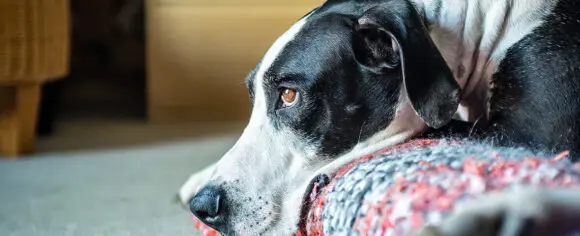What is colitis in dogs?
Although you or someone you know may suffer from colitis, humans aren’t the only species that can experience this painful and unpleasant condition.
It occurs in several animal species as well, including dogs. Colitis is a condition in which the colon becomes inflamed, which can cause several problems including diarrhea, pain and discomfort and difficulty defecating.
Causes of colitis.
Colitis in dogs can be caused by several factors, just like with humans. One of the most common causes of colitis in dogs is stress. Although stress is not a direct cause of colitis, stress can put added pressure on a dog’s immune system, which can make your dog more susceptible to a colitis flare-up.
Other causes of colitis in dogs include:
- Irritable bowel syndrome
- Intestinal worms or parasites
- Food allergies
- Algae or fungal infections
- Gastro-intestinal infections
- Injury or damage to the colon
- Eating things that are not intended for dogs or poor eating habits
How to prevent colitis.
Although you can’t guarantee that your dog will never get colitis, there are several measures you can take to help prevent it.
- Have your veterinarian check for worms and parasites annually. Although stress is unavoidable, do your best to minimize the stress in your dog’s life.
- Make sure your dog eats a well-balanced diet and don’t feed your pooch unhealthy food and treats.
- Train Fido to “leave” anything he is tempted to eat off the ground when you take him for a walk.
- Consistently feed your dog the same well-balanced diet and avoid sudden changes.
Colitis symptoms in dogs.
Colitis symptoms in dogs can vary, but these are the typical signs:
- Soft, runny feces or feces with bright flecks of blood
- Pain while defecating
- Irregular eating habits
- Weight loss
- Increased defecating or flatulence
- Inflammation or pain in the lower regions
Diagnosing colitis in dogs.
To diagnose colitis, your veterinarian, like an internal medicine specialist, will need to perform an examination. Bring with you your dog’s most recent stool sample to be checked for worms and parasites. Your veterinarian may take an X-ray or order a biopsy of your dog’s colon if needed.
Treating colitis.
If your veterinarian determines that your dog has colitis, there are several treatment options. In most cases, your veterinarian will recommend that your dog not eat anything at all for about two days to “rest” his intestinal tract. After this period of fasting, you will begin to re-introduce high-fiber foods.
Antibiotics may also be needed to help fight any infection that may be causing your dog’s colitis.
Your veterinarian can help.
In most cases, your veterinarian will suggest your dog be treated at home under your watchful care. But if your dog is very ill, he or she may need to be admitted to the hospital and treated through an IV.
The good news is that colitis is generally treatable in dogs, although it can reoccur after the initial bout of illness. However, if you take extra care to watch what your dog eats and make sure he or she has routine checkups with the veterinarian, you will be helping to prevent future flare-ups.
BluePearl Pet Hospitals offer internal medicine specialty care in many of our hospitals across the country. Find a BluePearl internal medicine specialist near you.


